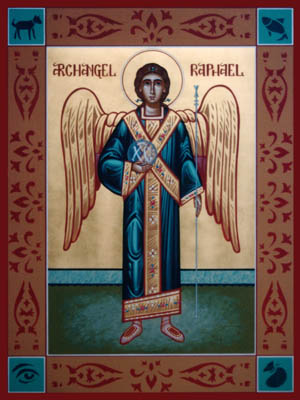Tobit
| This article forms part of the series on the The Old Testament - Septuagint | |
| or simply "LXX", the Koine Greek version of the Hebrew Bible. | |
| Pentateuch or "the Law" | |
| 1.Genesis | 2.Exodus | 3.Leviticus | 4.Numbers | 5.Deuteronomy | |
| Historical Books | |
| 6.Joshua | 7.Judges | 8.Ruth 9.I Kingdoms | 10.II Kingdoms | 11.III Kingdoms | 12.IV Kingdoms | |
| Books of Wisdom | |
| 24.Book of Psalms | 25.Job | 26.Proverbs 27.Ecclesiastes | 28.Song of Solomon 29.Wisdom of Solomon | 30.Wisdom of Sirach | |
| The Prophets | |
| The Minor Prophets, or "The Twelve" 31.Hosea | 32.Amos | 33.Micah | 34.Joel | 35.Obadiah | 36.Jonah | |
| The Major Prophets 43.Isaiah | 44.Jeremiah | 45.Baruch | 46.Lamentations | |
| Appendix | |
| IV Maccabees | |
Tobit is a book of the Septuagint (Old Testament) for both Orthodoxy and Catholicism containing 14 chapters. It was probably originally written in Aramaic, as four fragmentary copies of the Aramaic text were found at Qumran. The author of the book is unknown. This book tells the story of a righteous Israelite of the Tribe of Naphtali named Tobit (whose name means, "(YHWH is) my good", Heb. טובי or טוביהו, Gr. Τωβίτ) living in Nineveh after the deportation of the northern tribes of Israel to Assyria in 721 BC under Sargon II. (The first two and a half chapters are written in the first person while the rest are in third person.) He was particularly noted for Archangel Raphaelhis diligence in attempting to provide proper burials for fallen Israelites who had been slain by Sennacherib, for which the king seized all his property and exiled him. After Sennacherib's death, he was allowed to return to Nineveh, but again buried a dead man who had been murdered on the street. That night, he slept in the open and was blinded by bird droppings that fell in his eyes. This put a strain on his marriage, and ultimately, he prayed for death.
The main narrative is dedicated to Tobit's son, Tobiah or Tobiyah (Greek: Τωβίας/ Tobias), who is sent by his father to collect a sum of money that the latter had deposited some time previously in the far off land of Media. Raphael represents himself as Tobit's kinsman Azariah, and offers to aid and protect Tobias on his journey. Under the guidance of Raphael, Tobias makes the journey to Media, accompanied by his dog. Along the way, he is attacked by a giant fish, whose heart, liver and gall bladder are removed to make medicines.
Upon arriving in Media, Raphael tells Tobias of the beautiful Sarah, whom Tobias has the right to marry, because she is related to his tribe. He instructs the young man to burn the fish's liver and heart to drive away the demon when he attacks on the wedding night. The two are married, and the fumes of the burning organs drive the demon away to Upper Egypt, while Raphael follows him and binds him. Meanwhile, Sarah's father has been digging a grave to secretly bury Tobias (who he assumes will be dead). Surprised to find his son-in-law alive and well, he orders a double-length wedding feast and has the grave secretly filled. Since he cannot leave because of the feast, Tobias sends Raphael to recover his father's money.
After the feast, Tobias and Sarah return to Nineveh. There, Raphael tells the youth to use the fish's gall to cure his father's blindness. Raphael then reveals his true identity and returns to heaven. Tobit sings a hymn of praise. He tells his son to leave Nineveh before God destroys it according to prophecy. After the prayer, Tobit dies at an advanced age. After burying his father, Tobias returns to Media with his family.
New Testament Reference
The Sadducees' challenge to Jesus of the example of the woman that had seven husbands serially (e.g., Mark 12:20-22) may have been an allusion to this book’s story, with Tobit’s righteous son Tobias as Sarah’s ultimate husband. Note that Sarah's childlessness is allusive to the fact she is named after Sarah, the wife of Abraham.
